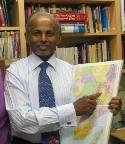Ukerewe Visit
Rotary's Helping Hand in Tanzania
ROTARY’S HELPING HAND
Class sizes of over 200, schools without access to water or toilets, 180 bed hospital with three doctors, no accident and emergency department, labour ward with no incubators, theatre with broken autoclaves – does this sound credible?
This is what we saw on the island of Ukerewe from where we’ve just come back after a two-week hands on project and want to share our story with you.
Ukerewe District comprises of 38 islands in Lake Victoria, of which 15 are permanently inhabited. There is a twice daily ferry connecting Ukerewe with mainland Tanzania - the journey takes 3.5 hours. There are smaller ferries between some islands, but others are reachable only by canoes.
The absence of internet and international telephone connection was a blessing; it allowed us to talk to each other and to others. We’d no exposure to the media either!
Ukerewe District has a population of 350,000 - most are subsistence farmers or fishermen. The per capita income in the country is $1 per day; on Ukerewe it is half that. The island has 1 hospital with 180 beds, 3 doctors and has very limited facilities.
Every month over 350 babies are born in the hospital - the medics told us that there are many preventable deaths due to lack of a premature baby unit. We saw a premature baby in a normal bed almost certainly unlikely to survive. Another child was born with jaundice but there was no scope of phototherapy.
Despite poor facilities the staff are doing amazing work. They have high clinical skills and work long hours, some looked burnt out. The Hospital authorities appealed for help such as supply of vital equipment, training, provision of motor bike ambulances etc.
We were overwhelmed by the warmth and affection of the people - those in authority as well as those we met in the streets. We were invited to attend a District Council meeting which started with ‘Amazing Grace’.
Our main focus was a feeding programme funded by Rotary in 7 schools. In each school there was an afterschool environment club of 30 who received training in good farming techniques and have put that into practice to grow maize, sorghum and vegetables. All schools were using the crops to feed the kids, usually three times a week, during the harvest season. Some schools also sold vegetables to supplement the feeding.
Almost all schools have over 1,000 pupils, classes of 200, virtually no learning facilities, no IT or sport; most lack toilets and have no access to water. The feeding programme is a great success, although it only provides food for limited days. One Headmaster told us that without this programme the pupils will have no food to eat during the day and would be lucky to have something to eat when they got home in the evening.
Supplying 20 sewing machines, introducing re-usable sanitary pads, organising a school quiz and reviewing the many things we have done before kept us busy and well connected with the community. Many lacked basic amenities and have huge financial and health problems such as malaria, high maternal deaths and child mortality. But they are kind, generous and warm - they always welcomed us with board smiles and trust. We felt blessed.
We felt enriched by this visit but also challenged at the gross inequalities in the world. We were delighted that Rotary was making a difference to lives in this remote part of Africa.
We are already planning our next visit and projects. We hope that we would have the chance to share our hopes and aspirations with you – please contact me for a presentation.
John Philip
Newbury Rotary Club
johnphilip@btconnect.com
07889 388038
 Contact John Philip about this page:
Contact John Philip about this page:
back to page above this...

Community Service
back Newbury Rotary Club supports and organises a variety of community activities for all ages.






